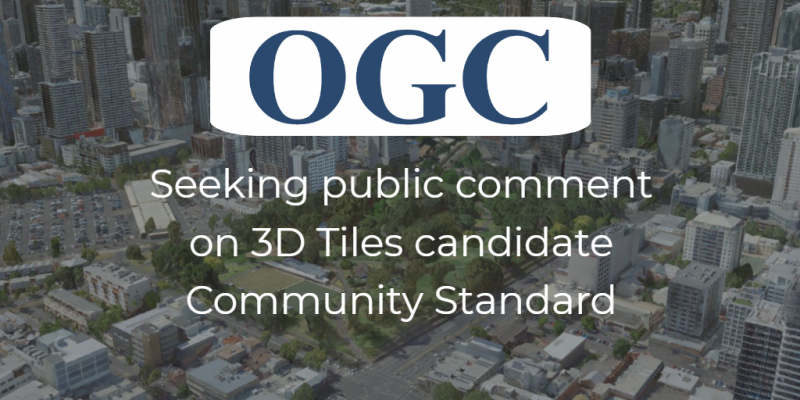3D Tiles Community Standard is designed for streaming massive heterogeneous 3D geospatial datasets for visualization

The Open Geospatial Consortium (OGC) seeks public comment on the 3D Tiles Specification 1.0 candidate Community standard.
3D Tiles is a publicly available open specification for streaming massive heterogeneous 3D geospatial datasets for visualization. To expand beyond existing 2D and 2.5D streaming of map tiles and terrain, 3D Tiles support 3D models such as point clouds, 3D buildings (exterior and interior), trees, imagery, BIM/CAD models, and terrain. 3D Tiles is currently implemented in more than a dozen software products.
Bringing techniques from graphics research, the movie industry, and the game industry to 3D geospatial, 3D Tiles defines a spatial data structure and a set of tile formats designed for 3D, and optimized for streaming and rendering. The tile formats are:
- Batched 3D Models – for 3D buildings, terrain, BIM/CAD models, etc.
- Instanced 3D Models – for trees, bolts, valves, etc.
- Point Clouds – for massive point clouds, including per-point attributes.
- Composite – a tile of tiles to allow aggregation.
A Community Standard is an official standard of the OGC that is developed and maintained external to the OGC. The originator of the standard brings to OGC a “snapshot” of their work that is then endorsed by OGC membership as a stable, widely implemented standard that becomes part of the OGC Standards Baseline. In 2016, OGC approved a work item on endorsing 3D Tiles as an OGC Community Standard, and now this effort is ready for consideration for approval by OGC members.
The candidate 3D Tiles Specification 1.0 community standard is available for review and comment on the OGC Portal. Comments are due by 1 August 2018 and should be submitted via the method outlined on the 3D Tiles Community Standard's request page.
About OGC
The Open Geospatial Consortium (OGC) is an international consortium of more than 525 companies, government agencies, research organizations, and universities participating in a consensus process to develop publicly available geospatial standards. OGC standards support interoperable solutions that ‘geo-enable' the Web, wireless and location-based services, and mainstream IT. OGC standards empower technology developers to make geospatial information and services accessible and useful within any application that needs to be geospatially enabled. Visit the OGC website at www.opengeospatial.org.
“






